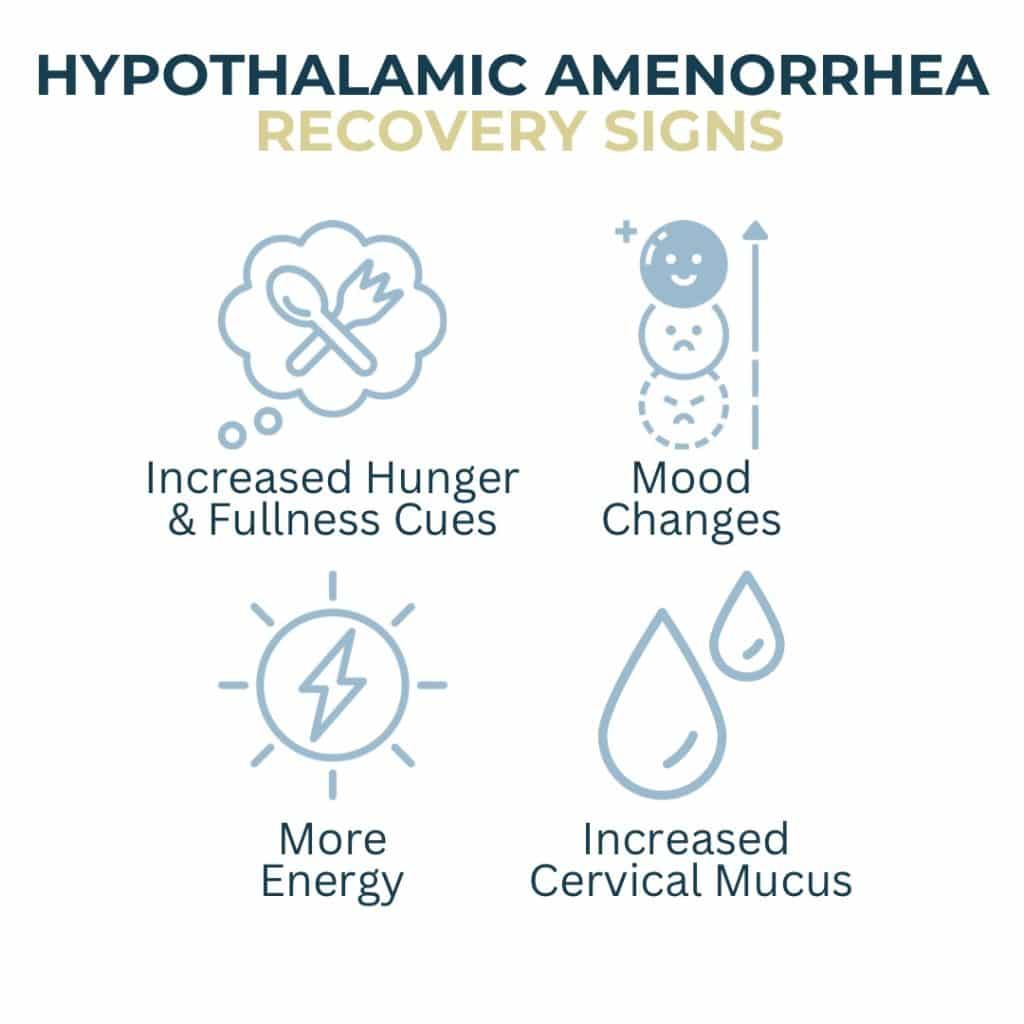Have you received a diagnosis of hypothalamic amenorrhea and wondering what are some recovery signs?
Hypothalamic amenorrhea is a term that describes the loss of periods due to hormonal changes from low calorie intake, excessive exercise, stress, and disordered eating. Achieving a regular menstrual cycle again is hard work and requires months of consuming appropriate caloric intake.
As a performance dietitian, I can help support your recovery journey by helping you to meet your energy needs to get your body back on track with regular menstrual cycles.
Hey, I’m Jenn, a Registered Dietitian who has a passion for helping individuals fuel, think, and move towards the best versions of themselves without sacrificing their relationship with food. If you want practical, evidence-based nutrition advice to improve your performance and wellness — Learn how I can help.
This post will cover what amenorrhea and hypothalamic amenorrhea is, hypothalamic amenorrhea recovery tips, and hypothalamic amenorrhea recovery signs. Let’s begin…
What is Amenorrhea?
Amenorrhea is the loss of one or more menstrual cycles. There are two types of amenorrhea: primary and secondary amenorrhea.
Primary amenorrhea occurs when a female does not get her period by the age of 16. This can be caused by genetic or chromosomal abnormalities and problems with the hypothalamus or pituitary gland.
Secondary amenorrhea is the result of missing 3 periods in a row or not having periods for at least 6 months. This can result from natural causes (pregnancy, breastfeeding, and menopause), medications and therapies, hypothalamic amenorrhea, gynecological conditions, thyroid problems, and pituitary tumors.
What is Hypothalamic Amenorrhea?
In a previous post, we learned all about hypothalamic amenorrhea (HA) including the consequences, symptoms, what causes it, and how to get your period back. But for a quick refresh…
Hypothalamic amenorrhea is the loss of one or more menstrual cycles due to a decrease in hormones caused by low energy availability, excessive exercise, stress, and disordered eating.
Hypothalamic Amenorrhea Recovery Tips
The good news is recovery from hypothalamic amenorrhea is possible. The human body protects itself when under high levels of stress by shutting down functions (like the menstrual cycle) to conserve energy for necessary functions (like keeping your heart beating). It enters survival mode and is resistant enough to withstand an unbelievable amount of physical, emotional, and psychological stress.
Recovery is a journey that will take time and hard work. It includes balancing out your energy by either decreasing activity or/and increasing food intake, reaching and maintaining a healthy weight, and reducing stress.
The key is getting back in touch with hunger cues, building a healthy relationship with food, and increasing our energy intake. Some tips for this include:
- Eating every 2-3 hours. Adding 2-3 snacks in addition to 3 meals throughout the day can help.
- Eat before and after (even during) exercise and training. Excessive exercise is a cause of hypothalamic amenorrhea. Exercise is an appetite suppressant so we need to make sure we are fueling to have enough energy to perform and recover.
- Focus on calorie-dense foods (carbs and fats) like:
- Nut butter
- Seeds
- Nuts
- Oils
- Avocado
- Tortillas
- Honey
- Rice
- Bread
- Liquid energy (full-fat milk, sports drinks, juice)
- Drink more than just water…like juice, smoothies, and sports drinks to add easily digestible calories.
Hypothalamic Amenorrhea Recovery Signs
Increased Hunger and Fullness Cues
Changes in metabolism, hormones, and digestion while in an energy imbalance, either intentionally or unintentionally, can cause the body to lose touch with hunger and fullness cues.
When you begin to take in more energy, you may find that you are hungry all the time. This means your hormones are starting to regulate.
You must listen to your body and feed it. By doing this it will lead to:
- Increased satiety
- Decreased thoughts about food
- Fewer chances of overeating
- Your period coming back
Mood Changes
We previously learned that when under stress, our body slows down or stops the production of hormones that produce estrogen. Estrogen plays a role in regulating neurotransmitters in the brain including serotonin, dopamine, epinephrine, and norepinephrine. Research has shown that women with hypothalamic amenorrhea are at a higher risk of anxiety and depression.
With adequate energy consumption and the normalizing of hormone levels, many start to notice positive changes in their mood and emotional status.
More Energy
When energy stores are depleted and our body is running on low energy, we often start to experience low energy and trouble sleeping. As energy imbalances start to become balanced, you will start to notice that you have more energy and can sleep better.
Increased Cervical Mucus
During a normal menstrual cycle, you experience changes in the amount of cervical mucus (fluid produced from the cervix) throughout the cycle due to hormone changes. This is due to rising levels of estrogen which is needed to help sperm fertilize eggs during ovulation. After ovulation estrogen levels drop and progesterone levels rise leading to increased dryness and less cervical mucus.
If you start to notice that you are having an increase in cervical mucus discharge, this is a good sign your hormone levels are normalizing.

You do not have to go through Hypothalamic Amenorrhea Recovery Alone
Getting your period back takes a lot of work physically, mentally, and emotionally. While the process may seem daunting, recovery is possible
Having a support system is important during your recovery. A registered dietitian plays an important role by providing you with support and providing you with appropriate nutritional recommendations to help you correct energy imbalances. I would love to support your journey and recovery.
Together, we will create a sustainable fueling plan that incorporates the things you love while infusing nutrient packed foods along the way! Instead of limiting and avoiding certain foods, we will utilize all foods as fuel to help you succeed. When you finish you will improve your relationship with food, understand the importance of nutrient timing, and have confidence when choosing foods to fuel your body!
Schedule a free 15 minute discovery call to discuss…
- Your goals and nutrition challenges
- How we can work together to build your fueling plan.

Jenn Fink is a licensed and board-certified Registered Dietitian Nutritionist based in Minnesota. Her goal is to help busy people and families prioritize their health by living a balanced lifestyle and feed their families flavorful meals without spending hours in the kitchen. Jenn is passionate about all things food-related and enjoys making complex science easy to understand for her clients and readers.

